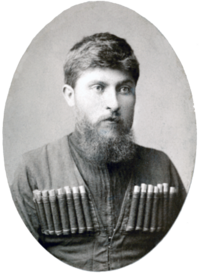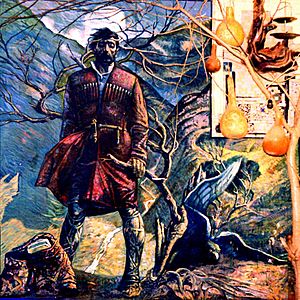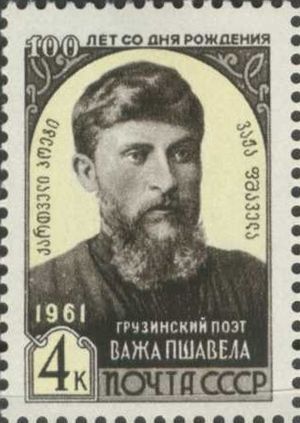Vazha-Pshavela facts for kids
Quick facts for kids
Vazha
|
|
|---|---|

Vazha in a chokha
|
|
| Native name |
ვაჟა
|
| Born | Luka Razikashvili 14 June 1861 Chargali, Tiflis Governorate, Russian Empire, now Georgia |
| Died | 10 July 1915 (aged 53) Tbilisi, Georgia |
| Resting place | Mtatsminda Pantheon |
| Occupation | Poet, short-story writer, philosopher |
| Genre | epic, drama, poetry |
| Literary movement | Modernism |
| Notable works | "Host and Guest" "Snake eater" "Aluda Ketelauri" |
| Spouse | Tamar Didebashvili |
| Children | Levan Tamar Gulkhan Vakhtang |
| Signature | |
 |
|
Vazha-Pshavela (Georgian: ვაჟა-ფშაველა), often called simply Vazha (Georgian: ვაჟა), was a famous Georgian poet and writer. His real name was Luka Razikashvili (Georgian: ლუკა რაზიკაშვილი). He was born on June 14, 1861, and passed away on July 10, 1915. His pen name, "Vazha-Pshavela," means "a son of Pshavians" in the Georgian language. He is known for his amazing poems and stories that often talk about the life and traditions of people living in the mountains of Georgia.
Contents
Who Was Vazha-Pshavela?
Vazha-Pshavela was born into a family of religious leaders. This happened in a small village called Chargali. This village is located in the mountainous Pshavi region of Eastern Georgia.
His Early Life and Education
Vazha-Pshavela finished his studies at the Pedagogical Seminary in Gori in 1882. Here, he became friends with Georgian populists. These were people who wanted to improve the lives of ordinary people. He then went to St. Petersburg University in Russia in 1883. He studied law there, but he had to return to Georgia in 1884. This was because he ran out of money.
Back in Georgia, he found work as a teacher of the Georgian language. He also became a well-known leader. He was part of Georgia's movement to gain freedom.
What He Wrote About
Vazha-Pshavela started his writing career in the mid-1880s. In his works, he showed the daily life and thoughts of the Pshav people of his time. He wrote many important literary works. These include 36 long poems called epics. He also wrote about 400 shorter poems. Some famous ones are "Aluda Ketelauri" and "Host and Guest". He also wrote plays, stories, and articles about literature and culture.
In his stories, he described the life of Georgian highlanders very accurately. He also showed a whole world of old myths and beliefs. In his poems, he often wrote about the heroic past of his people. He praised their fight against enemies, both from outside and inside their land.
Important Themes in His Works
In his best epic poems, Vazha-Pshavela explored big ideas. He wrote about how individuals interact with society. He also looked at how people connect with nature. Another theme was how human love connects with love for one's country.
For example, in his epics Aluda Ketelauri (1888) and Host and Guest (1893), he showed conflicts. These conflicts were between a person and their community. The main characters in these stories questioned old laws. They sometimes chose to ignore them. This was part of their journey to become more understanding and human.
A main idea in his poetry is about strong people. He wrote about their pride and their strong desire for freedom. He also touched on these ideas in his play The Rejected One (1894). Vazha-Pshavela admired the old traditions of the Pshav people. He saw their way of life as pure and true. He compared this to what he called "false civilization."
The wise character Mindia in the epic Snake-Eater (1901) dies. This happens because he cannot make his ideals work with the needs of his family and society.
The epic Bakhtrioni (1892) tells a story from history. It describes how mountain tribes helped in the 1659 uprising. This was when people in Kakheti (East Georgia) fought against Iranian rulers.
Vazha-Pshavela was also amazing at describing nature. He loved nature deeply. His descriptions of landscapes are full of movement and inner struggles. His writing style used all the richness of his native language. Yet, it was also very precise.
His Legacy and Influence
Vazha-Pshavela's works have been translated into many languages. These include Russian, English, French, and German. This has helped his poetry reach a wider audience. His poems and stories have been published in over 20 languages.
Vazha-Pshavela passed away in Tbilisi on July 10, 1915. He was buried in the Mtatsminda Pantheon. This is a very special burial place for important Georgians. He received this honor because of his great writing. He was also recognized for his role in Georgia's fight for freedom.
Donald Rayfield, a writer, said that Vazha-Pshavela was "qualitatively of a greater magnitude than any other Georgian writer." This means he was an incredibly important writer.
In 1961, a museum and memorial were built in Chargali. This was done to honor Vazha-Pshavela, the village's most famous son.
His Works
Epic Poems
- Aluda Ketelauri, 1888
- Bakhtrioni, 1892
- Host and Guest, 1893
- The Avenger of the Blood, 1897
- The Snake-eater, 1901
Other Poetry
- A Feast, 1886
- The Ogre's Wedding, 1886
- The Eagle, 1887
- I Was in the Mountains, 1890
- The Rock and the River, 1899
- I Gaze at the Mountains, 1899
- Orphaned Fledglings, 1899
- A Goldfinger's Will, 1891
- A Night in the Highland, 1890
- To the Mountains, 1920
Short Stories
- The Story of the Roebuck, 1883
- An Old Beech, 1889
- The Mountain's Height, 1895
- Sataguri (en: Mousetrap), 1908
Plays (for Theatre)
- The Scene in the Mountain, 1889
- Hunted of the Homeland (drama), 1894
- The Forest Comedy, 1925
Movies Based on His Works
- sophia (The encounter), a romantic drama from 1967. This movie was based on Vazha-Pshavela's poems "Aluda Ketelauri" and "Host and Guest." It won a big award at the 17th San Remo international Festival of Author Films in 1974. The director was Tengiz Abuladze.
- Mokvetili, a romantic drama from 1992. This film was based on Vazha-Pshavela's play Hunted of the Homeland. The director was Giorgi (Gia) Mataradze.
- "Host and Guest," a play adapted from Vazha-Pshavela's epic poem. This was created by Synetic Theater (Arlington, Virginia) in the USA in 2002. It was directed by Paata Tsikurishvili. You can watch a part of it here: [1]
See also
 In Spanish: Vazha-Pshavela para niños
In Spanish: Vazha-Pshavela para niños
 | Emma Amos |
 | Edward Mitchell Bannister |
 | Larry D. Alexander |
 | Ernie Barnes |



